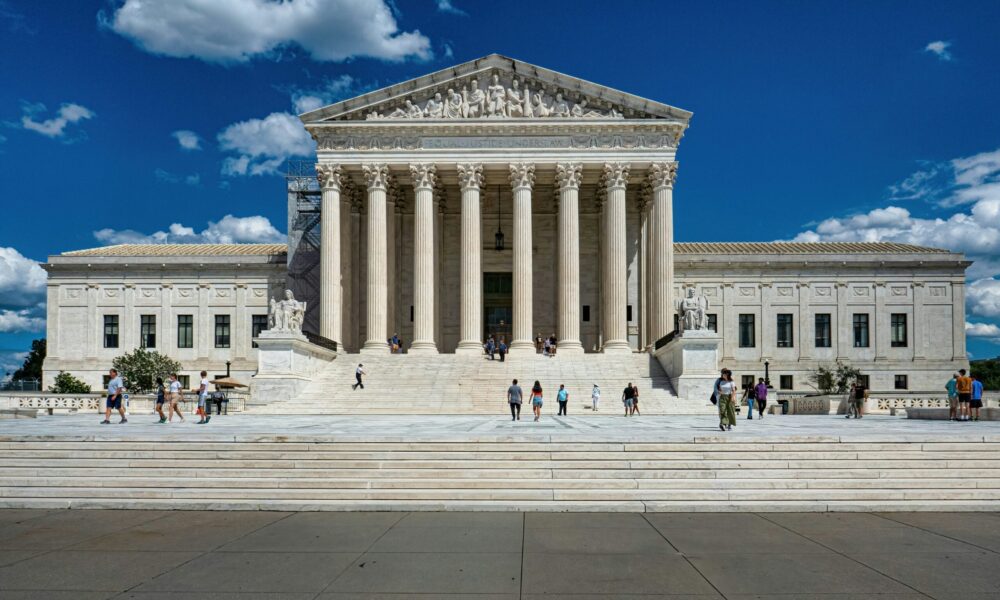Do we have a democracy anymore?
Just 100 days into a second Trump presidential term, many of us are asking that unsettling question. We’ve seen a range of threats: the introduction of bills like H.R. 22 that restrict voting rights; voting-hostile executive orders; election deniers taking power in key executive agencies; and discussion from President Trump himself and his allies in Congress about defying the Constitution’s presidential term limits. If this worries you, you’re not alone.
Public faith in our system is incredibly fragile at the moment. Only 34% of all Americans say they are satisfied with their democracy, according to a Gallup poll from January, up from an all-time low of 28% a year earlier. In a recent survey, political scientists reported a decline in the quality of our democracy and a risk of “a very fast slide” into authoritarianism. Democracy and voting rights have come under serious threat in recent years.
The Supreme Court’s role in voting-rights rollbacks
One major turning point in our democracy came in 2013, when the Supreme Court’s Shelby County vs Holder ruling all but gutted the Voting Rights Act (VRA) by striking down Section 4(b) and undermining Section 5 of the VRA, ending federal oversight of changes to voting laws nationwide and weakening voter protections. The VRA had been used to protect voters against discriminatory restrictions like reduced polling locations, onerous voter ID requirements, and curtailing voter registration and early voting options. Since the ruling, 30 states have implemented 114 restrictive voting measures that disproportionately create barriers for racial and ethnic minorities. Other court cases over the subsequent decade further reduced the effectiveness of laws like the Voting Rights Act, opening the door to extreme gerrymandering, ballot rejections and voter purges.
I was working at the national office of the NAACP during the Shelby ruling back in 2013. My colleagues at the NAACP and civil rights groups from across the country hoped that Congress would find a way to pass the Voting Rights Amendment Act to restore the VRA. Unfortunately, nearly 12 years later, under both Democratic and Republican control, Congress has been unable or unwilling to fix this vital law, hindering the ability of millions of voters to participate in the process. The 2021 Brnovich v. Democratic National Committee further weakened the federal government’s power under the VRA to review potentially-discriminatory voting changes.
Signed into law in August of 1965 by President Lyndon Johnson, the VRA was a major victory of the Civil Rights movement, as it finally outlawed discriminatory voting practices (such as literacy tests) adopted in many southern states after the Civil War to suppress Black voters. The gutting of this historic law has effectively reversed that victory and widened racial turnout gaps in elections. In fact, a Brennan Center study found that between 2012 and 2020, the white-Black turnout gap grew between 9.2 and 20.9 percentage points across five of the six states originally covered by Section 4(b) of the Voting Rights Act. And racial disparities in voting are a nationwide problem, as shown in our precinct analysis of 2020 results from counties in swing states.
Since the Shelby ruling, there have been several attempts to restore the VRA—including H.R. 14, the John R. Lewis Voting Rights Advancement Act—but, unfortunately, all have failed so far for various reasons, including the 60-vote filibuster threshold in the Senate and lack of bipartisan support. The VRA’s critics argue that federal oversight into state election laws is unnecessary—one of the same arguments used in the original VRA debates in the 1960s, resulting in the U.S. Supreme Court upholding the law in the 1966 Supreme Court case South Carolina v. Katzenbach. Today’s VRA opponents also focus their arguments on “election integrity,” relying on misleading or simply false claims to support restrictions on access to the ballot.
Suppression at work: gerrymandering
The ideal democracy requires impartially-administered elections that give everyone equal access to participate and the confidence that their vote will matter. Unfortunately, we’re not living in an ideal world.
Every ten years, redistricting authorities redraw electoral maps based on the census. When the maps are drawn fairly, that is a win for the democratic process. Sadly, all too often, these redistricted maps are drawn to serve a political interest via a process called gerrymandering. Gerrymandering occurs when a political map is redrawn to benefit or target a particular political party, racial group, or politician. This all comes at the expense of fair representation, where people from different ethnic, racial, or economic groups, those with shared cultural identities or languages, and other communities of interest can all have a fair shot at representation. Science, facts, and data should be what guides redistricting efforts, not political agendas. When politicians draw maps based on their own narrow interests, it demoralizes voters and erodes public trust in the democratic process.
Instead of these politicized and ideological attempts at redistricting, inclusivity should be prioritized by adopting policies like those UCS proposed in its recent Fair Maps report. The report recommends establishing a comprehensive public input process, which would involve hosting map-drawing forums, providing tools and training for open-source map-making, and ensuring legal compliance through data analysis. Additionally, public participation would be accessible through in-person and digital platforms, with outreach efforts considering Limited English Proficiency (LEP) populations and individuals with disabilities. Authorities would maintain transparent websites that house public input databases, policies, and essential redistricting documents.
Gerrymandering by both major parties, along with geographical polarization, has reduced the number of swing districts and made many districts unwinnable by an opposition party, often making primaries more important than general elections. This in turn reduces competitiveness, skews representation, and fosters public disillusionment.
Suppression at work: blocking access to the polls
The weakening of the VRA has had a major impact on U.S. elections, leading to increased voter suppression nationwide. As of 2024, 15 states enacted laws imposing harsher ID requirements for in-person and mail-in voting, disproportionately affecting vulnerable communities. For example, in Ohio, only four forms of unexpired IDs are accepted for in-person voting. In Idaho, student IDs were removed as valid identification, creating new barriers for student voters. In Arkansas, lawmakers eliminated the option of submitting a sworn statement in place of an ID and imposed restrictions on individuals collecting mail ballots.
These are not isolated incidents. They’re all part of a broader trend to restrict access to the ballot. And when voters’ rights are suppressed, it doesn’t just affect an individual voter: it makes it harder for elections to accurately reflect the wishes of the whole electorate.
Not surprisingly, these voter laws are often justified by false claims of widespread voter fraud, which research consistently disproves time, after time, after time. These laws don’t improve election security nor are they designed to do so but only serve to disenfranchise marginalized communities access to the ballot.
Democracy needs trust to work
When people feel as if their vote doesn’t matter, it erodes trust in institutions including science, journalism, and public health and opens the door to disinformation. We all saw this on full display during the COVID-19 pandemic, when false claims spread like wildfire and undermined public confidence in life-saving measures that were based on proven science.
More recently, legislation like the SAVE Act threatens to deepen public distrust. Introduced by Rep. Chip Roy (R-TX), the bill would require documentary proof of citizenship to register to vote. This recently passed the House and is now in the Senate. But it’s based on a false premise, attacking trust in elections under the cover of protecting their “integrity.”
There are already existing federal laws prohibiting noncitizen voting: the Illegal Immigration Reform and Immigrant Responsibility Act of 1996 (in division C of the Omnibus Consolidated Appropriations Act of 1996) and the National Voter Registration Act (NVRA) of 1993. These laws criminalize noncitizens voting, require voters to affirm citizenship under penalty of perjury, and establish that only US citizens can vote in federal elections. The SAVE Act is beyond unnecessary: it would disenfranchise millions of Americans, especially older adults, naturalized citizens, transgender Americans, low-income voters, African Americans, and women who’ve changed their names. It would also disrupt voter registration systems by undermining the NVRA. Far from protecting democracy, laws like this deepen exclusion and cynicism, making it harder for people to believe the system was ever meant to work for them.
Having a functioning democracy matters for scientists and advocates
Democracy that is ground in public trust allows science to better serve the public. Our policymakers utilizing evidence-based decision making strengthens communities and creates more responsive policies that bolster our democracy. Weak democratic systems often lead to unchecked power in a few hands, while disempowered communities are ignored and excluded and science that doesn’t align with the political agendas of the powerful is denied or attacked.
While attacks on science have intensified under this administration, they are not new. UCS’s Attacks on Science tracker, for example, highlights the long history of efforts by both major parties to suppress scientific findings. These efforts are undemocratic. They harm researchers and the democratic process as a whole and could have global consequences. Moreover, if a government official suppresses scientific publicly funded research at a federal agency, it could constitute a violation of the First Amendment. The suppression of research undermines public trust and weakens the informed decision-making process, which is key to a healthy democracy.
To defend democracy and scientific integrity, scientists need to venture beyond their labs and into civic life. Scientists can embrace the tools of democracy: voting, testifying before lawmakers, and organizing within their communities. Especially in times like these, where misinformation and conspiracy theories are on the rise, scientists of every discipline have a duty to push back on junk science and actively engage the public. That includes speaking out against the misinformation used to attack our democracy, and promoting evidence-based solutions to give everyone a voice.

